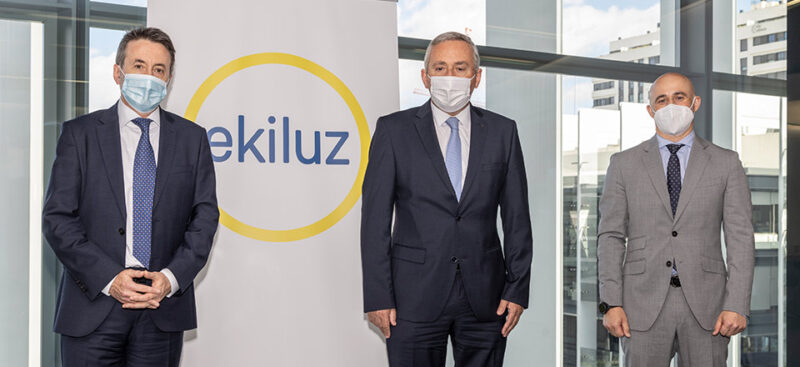-
Installation of solar farms of significant size, between 1 MW and 5 MW, will enable sustainable energy infrastructures close to the users, allowing them to take advantage of economies of scale.
-
Ekiluz will facilitate access to solar power regardless of the place of residence, ranging from urban centers with larger populations to rural areas.
-
It will promote a more active role of consumers in the energy sector. The members of the cooperatives will be able to generate as much renewable electricity as they consume and monitor the environmental benefits obtained.
PVTIME – Repsol and Krean (MONDRAGON Corporation) have joined forces to promote the creation of citizen cooperatives for renewable power generation through the launch of Ekiluz. The initiative aims to transform the relationship between consumers and energy, allowing the consumers to participate in the management of energy in a real and effective way. Repsol CEO Josu Jon Imaz, the Chairman of the Mondragón Corporation, Iñigo Ucín, and the Managing Director of Krean, Jon Berbel, today formalized this alliance at a meeting at Campus Repsol, the headquarters of the multi-energy company in Madrid.

This type of energy communities, aligned with European climate regulation, facilitate greater citizen involvement in renewable power generation. In the case of Ekiluz, it will enable widespread access to PV solar electricity, even in complex environments such as urban areas with vertical buildings and no immediate space to place solar panels. Ekiluz will also enable rural areas to organize and access collective installations, contributing to their socioeconomic development.
To achieve this, Ekiluz will use energy infrastructures of significant dimensions, with solar farms with capacities of between 1 MW and 5 MW that will generate local energy (kilometer 0). The objective is that the members of the cooperative benefit from savings associated with this type of installation and generate a volume of energy equivalent to their entire annual electricity consumption.
Each Ekiluz cooperative will build and operate infrastructures with a stable generation cost and for the very long term (25 years or even longer), following a model that combines technical and economic aspects with social aspects. Citizens will be able to participate in cooperatives that build and manage their farms and have their own identified solar panels, thus promoting a greater participation and control of the processes.
The results will be reflected in the electricity bill of each cooperative member, who will be able to monitor the generation of renewable electricity from the panels assigned to them, as well as the environmental benefits achieved.
Boosting the energy transition
The objective of Ekiluz is to expand renewable power generation and take a step forward in the energy transition, allowing anyone to generate as much renewable electricity as they consume annually. All of this with guaranteed backing of the nearest administrations and institutions to ensure proper management and assure an orderly and efficient development.
The energy communities developed as cooperatives will allow the presence of associations from the surrounding area, as well as public administrations such as city councils, provincial councils, and other entities that, within their energy transition strategy, want to accompany their community and empower neighbors to generate their own energy and manage the installations.
The Ekiluz project is driven by two partners, Repsol and Krean. They are committed to renewable projects supported by energy communities, integrating an industrial vision that guarantees the competitiveness of all the processes with a rigorous evaluation of each phase and each action. Specialized units from both groups will support the cooperatives to ensure the correct operation of the facilities throughout their useful life, providing them with expert, orderly, and efficient management input from Krean’s cooperatives and Repsol’s experience in large projects and energy commercialization.
Last November, during the presentation of its 2021-2025 Strategic Plan, Repsol took further steps towards its goal of becoming a net zero emissions company by 2050, outlining a demanding roadmap with more ambitious intermediate goals and investments totaling 18.3 billion euros between 2021 and 2025. 30% of the total, €5.5 billion, are earmarked for low-carbon initiatives.










